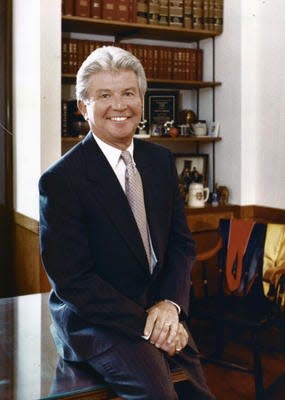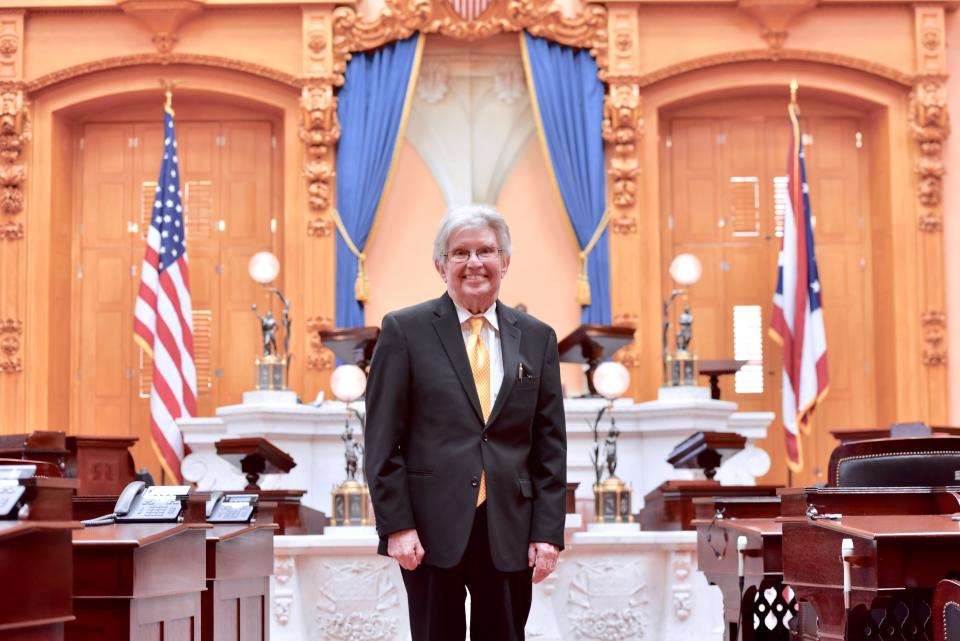Cincinnati civic giant, former Ohio Senate president Stan Aronoff has died at 91
- Oops!Something went wrong.Please try again later.
Cincinnati has lost a longtime civic leader, but his name remains an integral part of the cityscape, backlit by the dazzling lights of downtown.
Stanley Aronoff died on Jan. 31. He was 91.
Gov. Mike DeWine, who served with Aronoff in the Ohio Senate, called him a "true public servant" and described him as a driving force behind the restoration of the Ohio Statehouse.
The Cincinnati native was a former Ohio Senate president who spearheaded much of the city’s development from the early 1960s to the mid-1990s during more than three decades in public office. He pushed through vital legislation, steered state funding and arm-twisted governors on issues to help Cincinnati.

More: Top 10 moments of Aronoff Center's first 25 years
His most lasting mark on the city, the Aronoff Center for the Arts, was a culmination of his 30-year dedication to championing the local arts community. The center houses three performance spaces as well as the Weston Art Gallery. Nearly half of the state funding – $40 million of the $82 million project – to build the center was secured by Aronoff’s personal efforts. Under Aronoff’s direction, the center didn’t so much as herald downtown’s revitalization as create its rebirth.
Some other notable projects that benefited from state dollars through Aronoff’s intervention are the Cincinnati Convention Center expansion, Garfield Place, Bicentennial Commons at Sawyer Point, the conversion of Union Terminal into the Museum Center and improvements at Music Hall.
He remained entrenched in the arts throughout his life, dedicating time to organizations such as the Cincinnati Association for the Arts, the Cincinnati Contemporary Arts Center, Cincinnati Playhouse in the Park and the Classical Music Hall of Fame.

How Aronoff chose politics over acting
According to former Senate Chief of Staff Scott Borgemenke, Aronoff once considered an acting career but chose politics instead.
“The two are similar, though,” Borgemenke told The Enquirer in 1995. “Politics is one big stage.” And at the turn of the century in Cincinnati politics, Aronoff played a leading role.
Aronoff was born in North Avondale on June 8, 1932. He graduated in 1950 from Walnut Hills High School, where he is recognized in the school’s hall of fame for distinguished alumni. Shortly after earning both Bachelor’s and law degrees from Harvard University, he returned to Cincinnati to practice law.
In 1960, he was recruited by Hamilton County Republican Party leaders to run for a seat in the Ohio House of Representatives, which he subsequently won. There, he offered a bill that would create the Ohio Arts Council. This is only the beginning of a long history of Aronoff’s contribution to the Cincinnati arts community.
He served three terms in the House and moved to the Ohio Senate in 1967. During his long tenure in the Senate, he chaired many committees, including the Finance Committee. In the 1974 primary election, he made an unsuccessful bid for the Republican nomination for Ohio attorney general. He won reelection to the Senate in 1976. He served as president pro tempore from 1985 to 1988 and Ohio Senate president from 1989 to 1996.
In the Senate, Aronoff was considered a master of compromise and the 11th-hour deal. He was known as a fundraiser, fiscal wizard and candidate recruiter. His fundraising skills were on display in 1989 when Aronoff got a commitment from then Gov. Richard Celeste to support money for planning of a performing arts center and state office tower in Cincinnati. That arts center, later to bear his name as the Aronoff Center, would open in 1995 to immediate and continual acclaim.
In the 1990s, he was among 11 legislators involved in a “pancaking” scandal in which they were accused of failing to report large payments by getting stacks of small speaking fees. In 1996, Aronoff pleaded no contest to two misdemeanor counts of failing to file accurate financial disclosure statements. He was sentenced to pay a $500 fine and court costs as well as 50 hours of community service by teaching proper ethical conduct for public officials to college and elementary school students in his Cincinnati district. Though he could have run for one more term, Aronoff declined and finished his political career in 1996.
“I don’t think many people in Cincinnati realize how much he meant to the development of this city and how highly regarded he is in every other city of the state,” M.J. Klyn, a former University of Cincinnati vice president and the school’s Statehouse lobbyist, told The Enquirer in 1995. His departure from the political scene marked “the end of an era,” according to Klyn.
After politics, Aronoff returned to law practice
After his political career, Aronoff worked as a lawyer and lobbyist. He returned to private practice with Aronoff, Rosen and Hunt. He also became a consultant through two consulting companies: Aronoff & Associates, Inc., and State Street Consultants.

In 2005, Aronoff received the Irma Lazarus Award during the Ohio Governor’s Awards for the Arts ceremony. The award is given to a person or organization that has helped shape public support for the arts and brought greater recognition to Ohio.
The Aronoff Center isn’t the only building to bear his name. He also shares his namesake with academic buildings: the Aronoff Center for Design and Art at University of Cincinnati and the Stanley J. Aronoff Laboratory of Biological Sciences at Ohio State University.

He was a husband, father, grandfather and great-grandfather.
He is survived by his wife, Janet Aronoff; daughter Tracy Aronoff; and granddaughter Toria Aronoff Schottenstein; and his sister Bonnie Gibson.
He is preceded in death by his son, Jay Aronoff; daughter, Leslie Aronoff; and grandson Zach Aronoff.
Ahead of the end of his 36-year political career, Aronoff told The Enquirer, “I want to be remembered for the good deeds, for some of the unnoticed constituent work we did … I want to be remembered for more than the bricks and mortar. I want to be remembered as a person who cares about people."
Former Enquirer intern Rachel Smith and former Enquirer statehouse bureau chief Chrissie Thompson contributed to this report.
This article originally appeared on Cincinnati Enquirer: Former Ohio lawmaker, Cincinnati backer Stanley Aronoff dies at 91

